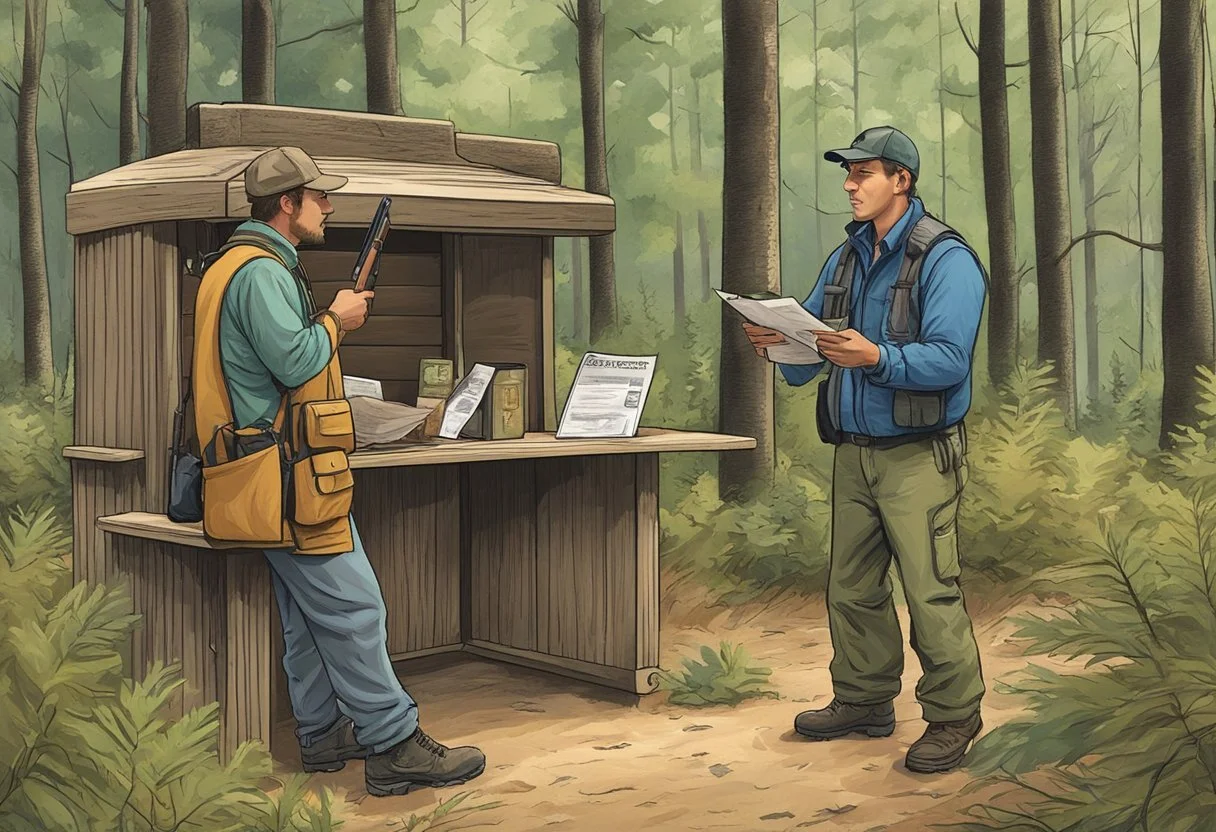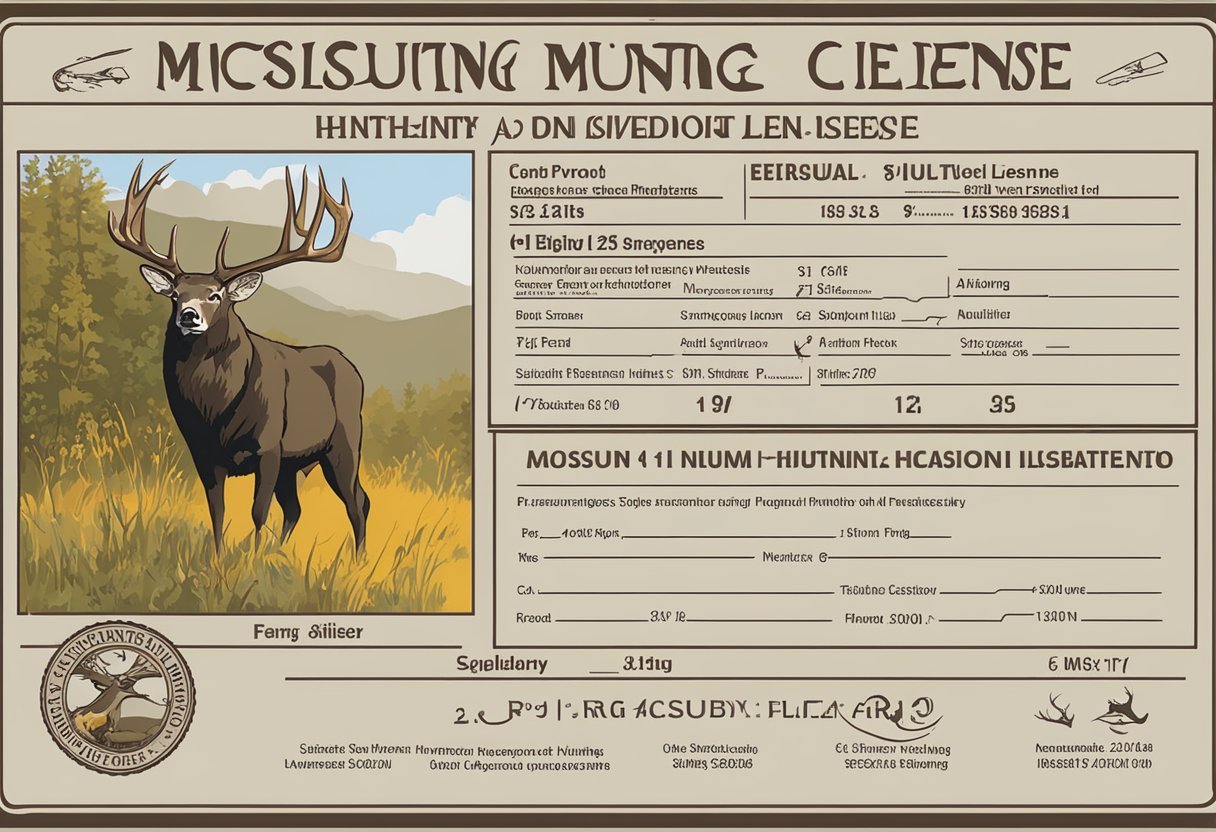How to Get a Missouri Non Resident Hunting License
A Guide to Regulations and Application Process
This Article is Part of Our Guide to Non Resident Hunting Licenses by State
Missouri offers diverse wildlife and habitats, attracting nonresident hunters looking to pursue game such as deer, turkey (What wine goes well with turkey?), and waterfowl. For those not residing in Missouri, obtaining a nonresident hunting license is a structured process managed by the Missouri Department of Conservation (MDC). These licenses are mandatory for anyone wishing to hunt in the state without being a permanent resident. The MDC provides a comprehensive system for nonresidents to purchase the appropriate permits for various species and hunting seasons, ensuring that hunting practices align with conservation efforts and legal regulations.
The types of available nonresident hunting permits in Missouri vary, covering different game species and hunting methods. Costs for these permits also differ according to the species, season, and hunter classification, such as youth or landowners. Nonresident permits enable hunters to participate in Missouri's regulated hunting seasons, adhering to specific rules and limitations set forth by the MDC. Hunters can find permits for small and big game, including special permits for deer, turkey, and waterfowl hunting. It is essential for nonresident hunters to understand these permits' requirements and limitations to ensure a legal and ethical hunting experience.
Eligibility and Requirements
When pursuing hunting activities in Missouri, nonresidents must understand the specific eligibility criteria and requirements that govern their ability to obtain a hunting license. Addressing the status of residency and hunter education certification is crucial for compliance with Missouri’s Department of Conservation regulations.
Residency Definition
For the purpose of hunting in Missouri, a nonresident is defined as an individual who does not meet the criteria to be considered a Missouri resident. Nonresidents are typically those who have not lived in Missouri for at least 30 consecutive days. Special considerations apply to active military personnel and students, who may still be considered residents even if they are temporarily stationed or studying out of state.
Hunter Education Certification
To hunt in Missouri, nonresidents must have successfully completed a Hunter Education Certification from Missouri or another state. This certification is mandatory for all hunters born on or after January 1, 1967. An exception exists for the Apprentice Hunter Authorization, which allows an individual to hunt if accompanied by a properly licensed adult mentor. Nonresidents should remember that this authorization is a temporary exemption from the typical hunter education requirements.
Types of Licenses
Missouri offers a variety of licensing options to nonresident hunters, catering to those interested in pursuing different game species and using diverse hunting methods. Understanding the specifics of each license and permit is crucial for legal and successful hunting experiences in the state.
Nonresident Hunting Licenses
Nonresident Daily Small Game Permit:
Cost: Varies
Species: Small game such as frogs, birds (excluding turkey), and mammals (excluding deer, elk, and furbearers)
Notable Restrictions: Does not permit the hunting of furbearers; however, they may be chased for dog training purposes in the off-season.
Nonresident Firearms Hunting Permit:
Cost: $265.00
Species: Deer and turkey
Type: Firearms specific
Nonresident Archery Hunting Permit:
Cost: Varies
Species: Deer and turkey
Type: Archery specific
Additionally, nonresidents interested in hunting migratory birds must possess a Federal Duck (What wine goes well with duck?) Stamp and a Migratory Bird Hunting Permit. Nonresident trappers must obtain appropriate trapping licenses to target furbearers legally.
Special Permits and Tags
Elk Hunting Permit:
Eligibility: Distributed by random drawing
Harvest: One (1) elk with at least one (1) antler no less than 6 inches in length
Deer Tags:
Types: Antlered and antlerless deer
Cost: Varies, with specific options for landowners and youth
Nonresident landowners who meet certain criteria may qualify for discounted landowner permits for hunting deer and turkey on their own land. Special hunting seasons, such as the Conservation Order Permit for waterfowl or the Trout Permit for specific fishing activities, are also available and require additional permits.
Lifetime small game hunting permits and fishing permits are options for those who frequently return to Missouri for hunting and angling pursuits, providing a long-term solution without the need to renew permits annually.
Hunting Seasons and Limits
Missouri offers diverse hunting opportunities for non-residents which include specific seasons for deer and turkey, waterfowl and migratory birds, as well as small game and other species. The state enforces hunting limits to maintain healthy wildlife populations and ensure sustainable hunting practices.
Deer and Turkey Seasons
In Missouri, the non-resident hunters can participate in deer and turkey hunting during designated seasons. Deer hunting typically includes an Archery season and a Firearms season, with different dates and permits applicable.
Archery Deer and Turkey: September 15 to November 10, and November 22 to January 15
Firearms Deer: November 15 to November 25
Youth Firearms Deer: Late October to early November
Antlerless Firearms Deer: Early December
Alternative Methods Season: December 25 to January 5
Limitations: There are specific bag limits depending on the type of permit purchased. These can include allowances for one deer of either sex and additional antlerless deer permits in certain areas.
Waterfowl and Migratory Birds
Waterfowl hunting is regulated through both state and federal guidelines. Hunters planning for ducks, geese, and other migratory birds must have a valid Migratory Bird Hunting Permit in addition to their non-resident hunting license.
Duck Season: Generally runs from late October to late December, with specific dates set annually.
Goose Season: Includes periods for Canada geese, White-fronted geese, and Snow/Ross's geese with specific season dates and the Light Goose Conservation Order which extends hunting opportunities to control populations.
Limits: Bag limits for ducks and geese vary by species but often include daily and possession limits. For instance, daily bag limits for ducks typically stand at 6, which must not include more than certain limitations per species such as 4 mallards (only two of which may be females).
Small Game and Other Species
Hunting for small game in Missouri covers species such as squirrels, rabbits, and other furbearers. Each species has a specific season and prescribed limits.
Squirrel: May 22 to February 15
Rabbit: October 1 to February 15
Other species, such as doves and woodcock, have special seasons usually beginning in September.
Training dogs on small game is permitted during the off-seasons, with restrictions ensuring that no game is taken.
Common limits for small game include daily bag limits and possession limits, and these can vary by species. For instance, dove hunters may be allowed a daily bag limit of 15 with 45 in possession.
By adhering to these regulations, hunters can enjoy a successful and legal hunting season in Missouri, contributing to the conservation and sustainability of the state's wildlife resources.
Application and Purchase Methods
Missouri's nonresident hunting permits can be acquired through several convenient methods, catering to hunters' preferences for online, postal, or in-person transactions.
Online Purchasing System
Nonresident hunters can easily purchase hunting permits online through the Missouri Department of Conservation's (MDC) official website. This system provides a streamlined process where they can select the desired permit, complete the necessary forms, and make a secure payment using a credit or debit card. The online system is accessible from computers and smartphones, making it possible to obtain permits at any time.
Mail and Telephone Options
For those who prefer traditional purchasing methods, Missouri offers permit acquisition via mail and telephone. Hunters can request an application form from the MDC and submit it through the mail. Alternatively, they can call the MDC's dedicated telephone service to complete the purchase with the assistance of a representative.
In-Person at Permit Vendors
Hunters have the option to purchase their permits in-person at authorized permit vendors located throughout Missouri. These vendors can be found in various outlets, including sporting goods stores, MDC offices, and more. Buying permits in-person is an excellent option for hunters who require immediate possession of their permits or prefer a direct transaction.
Pricing and Costs
Missouri's nonresident hunters are subject to specific fees and pricing structures for hunting licenses and permits. The costs reflect the effort to manage and conserve wildlife resources effectively while allowing hunters to engage in the sport.
License Fees and Prices
Nonresident hunters must purchase relevant permits to hunt in Missouri, and these come with established fees. For instance:
Nonresident Daily Small Game Permit: $14.00
Eligible game: Frogs, birds (except turkey), and mammals (except deer, elk, and furbearers)
Deer Hunting Permit: $265.00
Youth (ages 6-15): $9.50
Permit specifics: Allows hunting during designated deer seasons
The fees for Missouri's nonresident hunting licenses are designed to balance the needs of wildlife management with the accessibility for those who wish to hunt.
Additional Permit Costs
Additional permits may be required for certain species or during specific seasons. It is important for nonresident hunters to be aware that:
Apprentice Hunter Authorization enables new hunters to hunt under a mentor’s guidance. Hunters are usually expected to be in the immediate presence of a mentor who is at least 18 years old and hunter-education certified.
In the context of trout fishing, Nonresidents can also expect prices to adjust due to inflation, which may affect the cost of annual trout permits and daily trout tags starting on February 29, 2024.
For most types of fishing in Missouri, nonresidents will require a permit. There are, however, certain exemptions where one can fish without a permit, such as during specific free fishing days hosted by the state.
Regulations and Legal Requirements
In Missouri, nonresident hunters must adhere to specific regulations and legal requirements to hunt legally within the state. Compliance with these rules is mandatory and aimed at conservation efforts and ensuring hunter safety.
Hunting Regulations and Prohibitions
Missouri's hunting regulations dictate that nonresident hunters must obtain the appropriate permits before engaging in any hunting activities. For instance, a Nonresident Daily Small Game Permit allows the holder to hunt frogs, birds (except turkeys), and mammals (except deer, elk, and furbearers). It is critical to note that this permit does not cover the hunting of deer, elk, and furbearers. Furbearers cannot be taken with this permit, and nonresidents are prohibited from harvesting these animals without the appropriate permissions.
Hunters looking to hunt deer and turkey must purchase specific permits. Elk hunting, especially, is controlled through a random drawing system, and selected hunters are allowed to take one elk with a minimum antler size. Regulations also emphasize that each hunter must abide by bag limits, season frameworks, and hunting method restrictions specific to each game species.
Clothing and Identification
When it comes to clothing, nonresident hunters in Missouri are required to wear hunter orange during specific hunting seasons. For better visibility and distinction from game, the following items are mandated:
A hat with a minimum of 50% hunter orange visible from all sides
A shirt, vest, or coat with a minimum of 50% hunter orange
Camouflage orange clothing is acceptable as long as 50% of the surface area is hunter orange. This stipulation serves the dual purpose of helping hunters to be noticeable to other hunters while allowing them to remain unseen by certain types of game. Compliance with these regulations is non-negotiable and crucial for the safety of all parties involved in hunting activities.
Additional Resources
When seeking to obtain a Missouri Non-Resident Hunting License or enhance the hunting experience in Missouri, individuals can access a host of resources. For detailed information and assistance, the Missouri Department of Conservation (MDC) and technological tools are invaluable.
Conservation Efforts and Education
The Missouri Department of Conservation is a pivotal entity offering comprehensive education on conservation efforts. It provides extensive resources on wildlife preservation, habitat management, and responsible hunting practices. They offer hunters education courses, which are mandatory for anyone wanting to hunt in Missouri without a mentor. This education ensures that non-resident hunters are well-informed about Missouri's conservation guidelines and hunting regulations.
Information on various conservation efforts and education can be accessed via:
MDC Website (Educational Material)
Conservation Centers
Outreach Programs
Publications such as the Missouri Conservationist magazine
Hunting Apps and Technology
Technological integration has improved the hunting experience significantly. The MO Hunting app serves as a convenient digital tool for non-residents to buy, view, and store hunting permits. Additionally, the app provides real-time information on hunting seasons, regulations, and allows hunters to telecheck their harvests.
Key features of the MO Hunting app include:
Digital permits issuance
Harvest registration
Seasonal guidelines
Wildlife codes
Using these resources, non-resident hunters can ensure they have the proper permits, adhere to regulations, and contribute effectively to Missouri’s conservation efforts.
Special Considerations
When considering a Missouri Non-Resident Hunting License, special provisions are in place for veterans and active military personnel, and there are specific measures aimed at wildlife preservation. These considerations ensure both the welfare of wildlife populations, such as mussels, (What wine goes well with mussels?) clams (What wine goes well with clams?), turtles, and crayfish, and the recognition of service members.
Veterans and Active Military
Non-resident veterans and active military personnel are afforded opportunities that can include reduced fees or special permits in recognition of their service. They should check with the Missouri Department of Conservation for eligibility criteria and available benefits when applying for hunting licenses.
Wildlife Preservation
Missouri places a strong emphasis on the conservation of its wildlife resources. Regulations are enacted to protect sensitive species and ensure sustainable populations. Non-residents must adhere to specific rules concerning the hunting of various species and the use of live bait, which helps in preventing the overharvesting of native species like mussels, clams, and crayfish. Hunting licenses are tools employed not only to regulate hunter participation but also to contribute to conservation efforts.
#MissouriHuntingLicense #NonResidentHunting #OutofStateHunting #HuntingPermits #WildlifeConservation #OutdoorAdventures #HuntingRegulations





